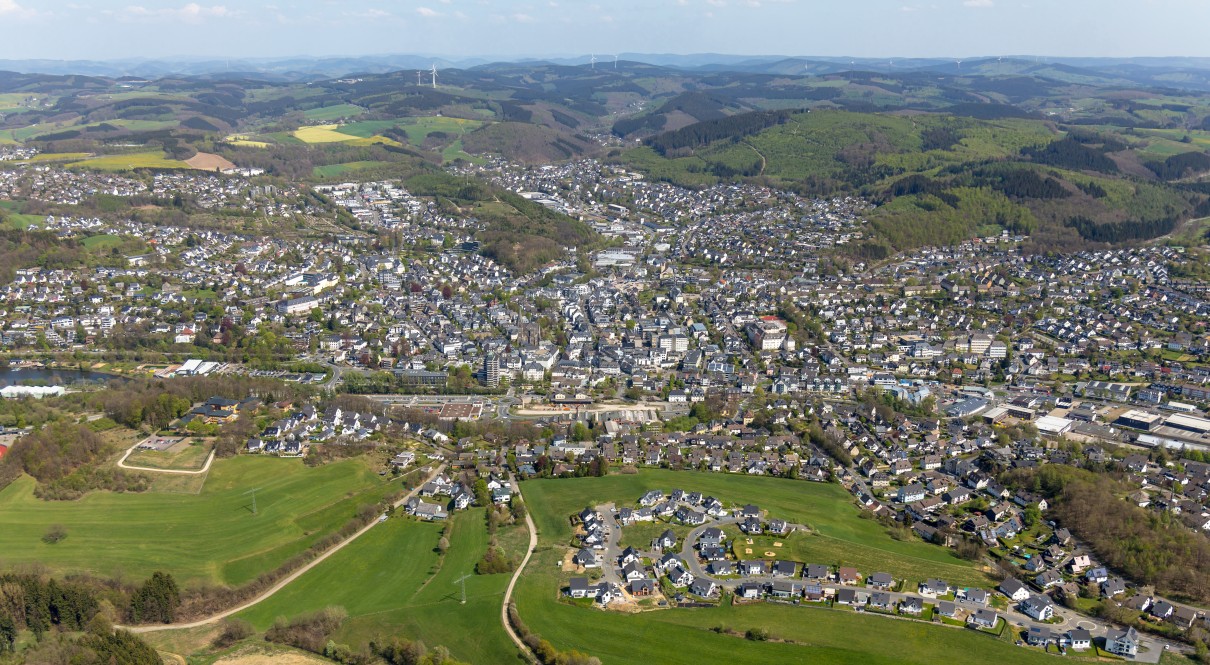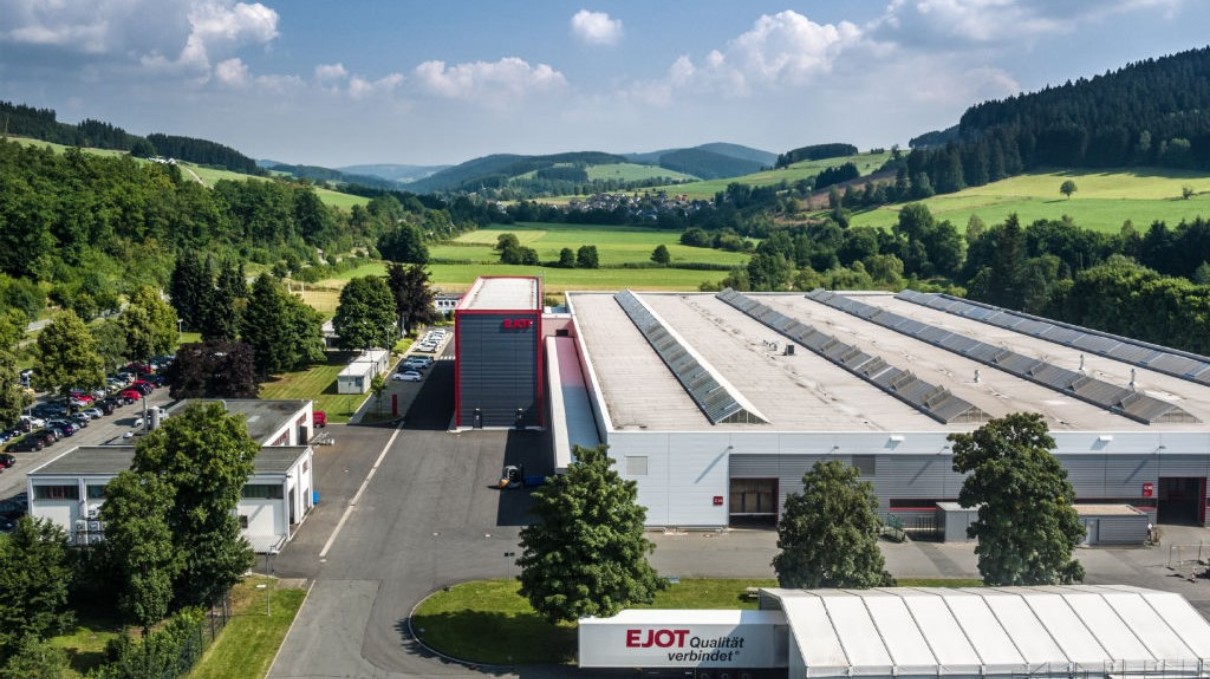Page content
South Westphalia on the way to becoming a Smart Region
Digitization has long since ceased to be a topic that only affects cities - more and more municipalities and rural regions are also embarking on the digital path. The South Westphalia region is no exception. "One of the strengths of South Westphalia is the good cooperation between a wide range of stakeholder groups from politics, business, administration and society. We think it makes sense to tackle the challenges of a rural region together and take advantage of opportunities," says Hubertus Winterberg, Managing Director of Südwestfalen Agentur GmbH. The five pioneering municipalities of Arnsberg, Bad Berleburg, Menden, Olpe and Soest are the "5 for South Westphalia" and have joined forces to develop smart solutions for sustainable cities for the benefit of their citizens and to share the knowledge gained in the process. Südwestfalen Agentur GmbH is creating the network office in the process, which will pass on the knowledge to the more than 50 cities and communities in South Westphalia. "Copying is expressly permitted," Dr. Stephanie Arens, Head of Regional Development and the Smart City model project at Südwestfalen Agentur GmbH. And the region of South Westphalia has an ambitious goal: It is on its way to becoming Germany's smartest region.
South Westphalia DNA
It all started in 2016, when the region once again applied to the state of North Rhine-Westphalia for the REGIONALE. The structural program is unique in Germany. Districts or subregions join forces and develop approaches to solutions for common challenges. The best ideas go through a qualification process, are promoted and implemented. "For us in the region, we have seen that the digital transformation is so drastic in all areas of life that we have to think together about how we want to position ourselves, what this means for the people of the region, for South Westphalia as the strongest industrial region in NRW and at the same time the largest nature park region in Germany, and what future generations expect from us in terms of sustainability, climate protection and co," says Dr. Stephanie Arens. The result is the Südwestfalen DNA - a leitmotif for shaping the future. "DNA stands for Digital-Sustainable-Authentic. All of the projects being implemented in REGIONALE 2025 carry this DNA. There are currently over 70 projects underway. The aim is to use digital transformation to develop the region sustainably so that future generations will still enjoy living, living and working in South Westphalia - and in a way that suits the region. Regardless of whether this concerns the topics of mobility, urban and village development, culture or digital education, or aspects such as sustainable (re)construction. And this DNA is also the leitmotif of the federal model project "Smart Cities: 5 for South Westphalia". Both are closely interlinked. Businesses, universities and tourism associations are also on the "digital path" and have initiated various digital and sustainable transformation processes.

Photo: Dominik Ketz
From strategy to implementation
After a lot of preparatory work, South Westphalia has also reached the practical part of the model project "Smart Cities: 5 for South Westphalia". The region is now becoming smarter on a selective basis and thus also as a whole. South Westphalia has compiled 16 measures (bundles) in a project portfolio that are now to be gradually implemented.
These include:
- Sustainable consumption: the Sustainable Consumption measure aims to investigate at two locations in South Westphalia how new consumption concepts can create more sustainable and resilient (inner) cities.
- Smart, networked mobility: In South Westphalia, which is in part very rural, motorized private transport (MIV) is the means of choice and an integral part of everyday mobility. In terms of a sustainable mobility turnaround, clever supplements and suitable mobility offers are needed. (By the end of 2023, the region will develop a mobility strategy in REGIONALE 2025, on which further measures and projects can then build).
- Digital urban experiences: The measure bundles various building blocks that digitally support and enrich urban experiences and promote networking and qualification in this regard.
- Smart infrastructure: The 5 for South Westphalia are pursuing the path of further building up competencies as climate-adapted municipalities and bundling them in the administration in order to create suitable solutions for local needs and to raise public awareness.
- Smart neighborhood and village development: The measure Smart Villages and Neighborhoods explores innovative ways to sustainably redesign residential neighborhoods, village centers and commercial areas. The focus is on how digital technologies can help revitalize living, working and community places and turn them into climate-friendly and inspiring places of togetherness, while also enabling resource-efficient construction.
- Volunteerism 4.0: As a goal of a smart region, existing structures and the established "ecosystem" of volunteerism must be re-enriched and supported so that they can have an even greater impact.
- Understanding and experiencing nature: The smart cities in South Westphalia are aligning themselves sustainably. This includes environmental education sites and offerings that serve to convey the preservation of natural resources. Here, digital offerings and formats that complement and enrich extracurricular learning sites or nature conservation centers are increasingly suitable.
- Lifelong learning and hybrid education: Rapid technological change and ever-shorter innovation cycles mean that many people feel left behind by digitization. This problem is to be countered so that people in South Westphalia are given the tools to find their way through the jungle of digital transformation.
- Smart Health: Demographic change, a shortage of skilled workers in the medical and nursing fields, and interface problems between individual areas of care present all municipalities in rural regions with the challenge of having to ensure health care close to home in the future. In order to actively counter this situation, existing technology-supported care concepts are to be examined under the conditions of rural areas.
- New Work: The New Work laboratories and experimental environments provide the framework and space for new work and workplace concepts. The possibilities of networked IT infrastructures in modern office systems that enable efficient communication are gaining in importance. This requires modern workplace solutions. The entire urban society benefits from more efficient administrative processes.
In addition to the 5 pioneer municipalities, more than 20 other municipalities have already been integrated via the "Smart Cities: School" networking format.
The open regional data platform Südwestfalen is currently under construction. It serves as a common basic architecture for smart cities, in which existing and new data from the cities and municipalities are to be networked and used intelligently. Individual pioneer municipalities will also receive a digital twin that can be used to analyze data and draw conclusions for the municipalities with the help of simulations. In addition, Southwestphalia is relying on many analog and digital networking and exchange formats to involve the people in the region in the process toward becoming a Smart Region. "The involvement of citizens already played an important role in the creation of the strategies in the pioneer municipalities - and should continue to do so. After all, all projects that are implemented should ultimately benefit the people of the region, offer more services and enable them to live well. The best understanding is created by concrete examples in everyday life. When you can book the next means of transportation on your smartphone, when public spaces are smartly lit, or when digital tools promote your own health. We are glad that we are now entering the phase of implementing concrete projects," emphasizes Hubertus Winterberg.
You're never too old for smart development
The city labs help to involve older people in particular in the South Westphalia region in the process: "These are contact points where older people can inform themselves and learn about digital technologies in a very informal way. However, such learning facilities also exist outside the smart city municipalities," explains Dr. Stephanie Arens. "In REGIONALE 2025, for example, a converted public bus is on the road as a mobile digital lab and is heading for village community centers. Everyone is invited to try out digital technologies there. The approach is never 'We'll show you what you can't do', but to awaken the fun of learning. In other REGIONALE 2025 projects, village activists are supported in being able to independently operate an app and a village website. Many projects are really about taking all generations along and providing appropriate offerings."
In 2025/26, the two funding projects "Smart Cities: 5 for South Westphalia" and the "REGIONALE 2025" will have their highlights in a performance show. "Finished" is not yet the region with it, however, says Dr. Stephanie Arens: "Our goal in South Westphalia is to achieve a high standard for the region as quickly as possible. However, the digital transformation alone is changing so rapidly that we see it more as a continuous process for society as a whole."
The perspective for the South Westphalia region extends to 2030 and is summarized in the Vision South Westphalia 2030.
In November, the region of South Westphalia will again be with us at the Smart Country Convention and present the development into a Smart Region, as well as practical examples.

South Westphalia is Germany's largest nature park region, the strongest industrial region in NRW and demonstrates with a lived collaborative approach that a Smart Region needs networking. Photo: Hans Blossey
Become an exhibitor at #SCCON25
As a driving force for the future of digital administration and for equal digital living and working conditions in cities and rural areas, the Smart Country Convention is a must for all stakeholders who actively advance the digital transformation. Are you interested in advancing the digitization of our cities and municipalities too? Join us and position your company or municipality as an expert in digitalization in the public sector.



